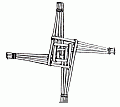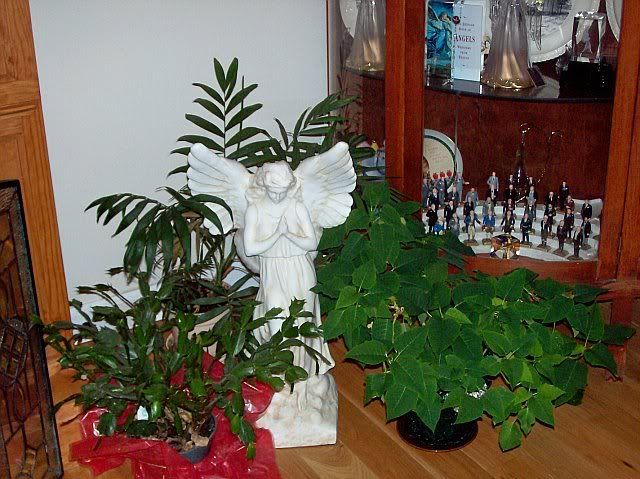Skip to comments.
Being Catholic: Sacred Things, Palm Branches
Fisheaters.com ^
| n/a
| Fisheaters.com
Posted on 04/22/2007 7:55:16 PM PDT by Salvation
Palm Branches

|
|
Palms are sacramentals of the Church distributed to the faithful on Palm Sunday (the Sunday before Easter) -- the day that commemorates Christ's entry into Jerusalem. Their purpose is to honor Christ's glory and Kingship, as did the inhabitants of Jerusalem who met Him, strewing palm branches on the street before Him.
Carrying palms (or olive or willow branches, etc., if palms aren't available) in procession goes way back into the Old Testament, where it was not only approved but commanded by God at the very foundation of the Old Testament religion. In the fall of the year, after the harvest, when the people gathered for the Feast of Tabernacles God said in Leviticus 23:40: And you shall take to you on the first day the fruits of the fairest tree, and branches of palm trees, and boughs of thick trees, and willows of the brook: And you shall rejoice before the Lord your God.
Again we read of palms in the II Machabees 10:6-8: And they kept eight days with joy, after the manner of the feast of the tabernacles, remembering that not long before they had kept the feast of the tabernacles when they were in the mountains, and in dens like wild beasts. Therefore they now carried boughs and green branches and palms, for him that had given them good success in cleansing his place. And they ordained by a common statute, and decree, that all the nation of the Jews should keep those days every year.
And in the 7th chapter of the Apocalypse, we see that those who were "sealed" are seen by John carrying palms: Apocalypse 7:9-10:
After this, I saw a great multitude, which no man could number, of all nations and tribes and peoples and tongues, standing before the throne and in sight of the Lamb, clothed with white robes, and palms in their hands. And they cried with a loud voice, saying: Salvation to our God, who sitteth upon the throne and to the Lamb.
The palms are blessed before the High Mass on Palm Sunday. Vested in red cope and standing at the Epistle side of the Altar, the priest recites a short prayer, and then reads a  lesson from the book of Exodus which tells of the children of Israel coming to Elim on their way to the Promised Land, where they found a fountain and seventy palm trees. It was at Elim that God sent them manna. lesson from the book of Exodus which tells of the children of Israel coming to Elim on their way to the Promised Land, where they found a fountain and seventy palm trees. It was at Elim that God sent them manna.
After a few verses from the New Testament, the priest reads the story of Christ's triumphal entry into Jerusalem the Sunday before His death, and about how the people put palms in the Savior's path and sang hosannas because, ironically, they expected a temporal victory by the One they thought would be the great military leader who would conquer the Romans..
Then we pray, begging God that we may in the end go meet Christ, that we may enter with Him into the eternal Jerusalem. The following preface and prayers ask God to bless the palms, that they may be sanctified and may be a means of grace and divine protection to those who carry them and treasure them with faith.
The palms are distributed to the people at the Communion rail. The priest will press the palm against your lips so you can kiss it, and then his hand. Alternatively, the palms may be handed out by the altar boys. In any case, Scripture and prayers follow, and then a procession of clergy, servers, and people through the church or outside around the church.
Some of these same palm branches are saved and burned the next year to make the ashes for the next Ash Wednesday -- the palms, which symbolize triumph, and the ashes, which sympbolize death and penitence, forming a great symbolic connection between suffering and victory.
The branches given to the faithful are held in the hand at the singing or reading of the Passion and the Gospel during the Mass, but when Mass is finished we take them home and hang them over crucifixes or holy pictures. Men will sometimes wear a piece of it in their hats or pin it to their lapels, and a piece should also be placed with one's sick call set.
It is custom to break off a piece of the palm and -- while praying to St. Barbara (or St. Walburga) for her intercession, and lighting a blessed candle (especially one blessed at Candlemas) -- burn it for protection against storms. I offer this prayer against storms from the Pieta prayerbook (make the Sign of the Cross at each + sign): Jesus Christ a King of Glory has come in Peace.+ God became man, + and the Word was made flesh.+ Christ was born of a Virgin.+ Christ suffered.+ Christ was crucified.+ Christ died.+ Christ rose from the dead.+ Christ ascended into Heaven.+ Christ conquers.+ Christ reigns.+ Christ commands.+
May Christ protect us from all storms and lightning. + Christ went through their midst in Peace, + and the Word was made Flesh.+ Christ is with us with Mary.+ Flee you enemy spirits because the Lion of the Generation of Juda, the Root David, has won.+ Holy God! + Holy Powerful God! + Holy Immortal God! + Have mercy on us. Amen.
Another custom is to shape the palm into Latin Crosses 1 before hanging them (for instructions, see the Palm Sunday page).
The next year, when we get new palms, the old palms are burned and their ashes buried.
Footnote:
1 There's another type of Cross that is woven by Catholics -- St. Brigid's Crosses (see picture at right). They are made on St. Brigid's Feast Day (1 February) out of rushes or reeds and hung on the inside of the front door of one's house, especially in Irish Catholic homes. They are left there all year and replaced the next St. Brigid's Day. St. Brigid's Crosses have their origin in the fact that a dying chieftan asked St. Brigid about a Cross she was shaping out of reeds. In explaining her gesture, she told him the story of Christ, and he converted. For instructions on how to make a St. Brigid's Cross, see the page on the Feast of St. Brigid.  |
TOPICS: Apologetics; Catholic; History; Religion & Culture
KEYWORDS: catholiclist; palmsunday
For your information and discussion.
1
posted on
04/22/2007 7:55:20 PM PDT
by
Salvation
To: nickcarraway; sandyeggo; Lady In Blue; NYer; american colleen; ELS; Pyro7480; livius; ...
Catholic Discussion Ping!
Please notify me via FReepmail if you would like to be added to or taken off the Catholic Discussion Ping List.
2
posted on
04/22/2007 7:56:43 PM PDT
by
Salvation
(" With God all things are possible. ")
To: All
3
posted on
04/22/2007 7:58:18 PM PDT
by
Salvation
(" With God all things are possible. ")
To: Salvation
**Some of these same palm branches are saved and burned the next year to make the ashes for the next Ash Wednesday**
I make my palm into a cross and affix it inside my front door and then next year shortly before Ash Wednesday I take it back to my parish to be burned.
4
posted on
04/22/2007 8:06:20 PM PDT
by
Macoraba
To: Macoraba
I take all mine from the crucifixes down and at our Lenten Fair, they burn all the palms inside a huge piece of foil, let it cool down, and wrap it up for Ash Wednesday. Gives us a lot of ashes.
5
posted on
04/22/2007 8:14:27 PM PDT
by
Salvation
(" With God all things are possible. ")
To: All
6
posted on
04/22/2007 8:41:55 PM PDT
by
Salvation
(" With God all things are possible. ")
To: Salvation
Thank you for posting all this wonderful information. It’s great to have it all in one place!
7
posted on
04/23/2007 6:15:52 AM PDT
by
nanetteclaret
("Wherever the Catholic sun doth shine, there's always laughter and good red wine." Hilaire Belloc)
To: nanetteclaret
And it provides an educational base for ALL Catholics and other people of other faiths!!
Lk 19:28-40
Jesus proceeded on his journey up to Jerusalem.
As he drew near to Bethphage and Bethany
at the place called the Mount of Olives,
he sent two of his disciples.
He said, “Go into the village opposite you,
and as you enter it you will find a colt tethered
on which no one has ever sat.
Untie it and bring it here.
And if anyone should ask you,
‘Why are you untying it?’
you will answer,
‘The Master has need of it.’”
So those who had been sent went off
and found everything just as he had told them.
And as they were untying the colt, its owners said to them,
“Why are you untying this colt?”
They answered,
“The Master has need of it.”
So they brought it to Jesus,
threw their cloaks over the colt,
and helped Jesus to mount.
As he rode along,
the people were spreading their cloaks on the road;
and now as he was approaching the slope of the Mount of Olives,
the whole multitude of his disciples
began to praise God aloud with joy
for all the mighty deeds they had seen.
They proclaimed:
“Blessed is the king who comes
in the name of the Lord.
Peace in heaven
and glory in the highest.”
Some of the Pharisees in the crowd said to him,
“Teacher, rebuke your disciples.”
He said in reply,
“I tell you, if they keep silent,
the stones will cry out!”
8
posted on
04/23/2007 7:16:49 AM PDT
by
Salvation
(" With God all things are possible. ")
To: Salvation
Palms are sacramentals... What exactly does Rome mean by sacramentals?
9
posted on
04/23/2007 7:20:56 AM PDT
by
Gamecock
(The Gospel Provides What The Law Demands)
To: Gamecock
Sacramentals are distinguished from sacraments.
Sacraments were instituted directly by Christ and are effective at giving grace all by themselves. If you are baptized, you are baptized, end of story. If you are ordained, you are ordained. The Church has no authority to add or take away sacraments, only to regulate their form somewhat.
Sacramentals are instituted by the Church and can be invented and suppressed at will. They are only effective insofar as the person using them is disposed to receive the grace. So if a person uses holy water piously, he can receive grace from it. But it is by no means certain or automatic. Likewise blessings, palms, etc. etc.
Do you do the Lord’s Supper at your church? If so, your view of that rite would probably be equivalent to what we consider a sacramental.
10
posted on
04/23/2007 9:07:07 AM PDT
by
Claud
To: Gamecock
Sacramentals are distinguished from sacraments.
Sacraments were instituted directly by Christ and are effective at giving grace all by themselves. If you are baptized, you are baptized, end of story. If you are ordained, you are ordained. The Church has no authority to add or take away sacraments, only to regulate their form somewhat.
Sacramentals are instituted by the Church and can be invented and suppressed at will. They are only effective insofar as the person using them is disposed to receive the grace. So if a person uses holy water piously, he can receive grace from it. But it is by no means certain or automatic. Likewise blessings, palms, etc. etc.
Do you do the Lord’s Supper at your church? If so, your view of that rite would probably be equivalent to what we consider a sacramental.
11
posted on
04/23/2007 9:07:08 AM PDT
by
Claud
To: Claud
Our (Reformed) view is that Sacraments are those acts commanded by Christ and are means of Grace. Baptism and communion are both Sacraments. I don’t think we have the distinction of sacramentals.
Means of Grace are not “for us not a means for attaining grace, but for receiving grace. They are not rituals through which we proclaim our willing and running, but through which God proclaims his willing and running.” Michael Horton
Thanks for the explanation!
12
posted on
04/23/2007 9:23:21 AM PDT
by
Gamecock
(The Gospel Provides What The Law Demands)
To: Salvation
Most inspiring lesson.
13
posted on
04/23/2007 9:26:06 AM PDT
by
Ciexyz
(Is the American voter smarter than a fifth grader?)
To: Gamecock
My pleasure! (and sorry for the double post!)
Our (Reformed) view is that Sacraments are those acts commanded by Christ and are means of Grace. Baptism and communion are both Sacraments. I don’t think we have the distinction of sacramentals.
Ah...I see. Well, let me ask this then--because I know this was a point of contention in the Reformation. Does the sacrament of baptism in your understanding infallibly produce its effect? In other words, does the actual washing of water and Spirit remit sins and induct one into the Body of Christ? Or is it more that a person who is *already* a believer goes through the sacrament to sort of confirm that fact? Are sacraments symbolic only, or symbolic and real at the same time?
14
posted on
04/23/2007 9:33:34 AM PDT
by
Claud
To: Claud
Does the sacrament of baptism in your understanding infallibly produce its effect? For the elect, yes.
In other words, does the actual washing of water and Spirit remit sins and induct one into the Body of Christ?
No, Christ remits sin. (and we may have a different definition of remit). Induct? We believe it signifies and seals our ingrafting into Christ.
Or is it more that a person who is *already* a believer goes through the sacrament to sort of confirm that fact?
Yes and no. (see the last answer)
Are sacraments symbolic only, or symbolic and real at the same time?
I'll let the Westminster Shorter Catechism answer that one:
Q. 91. How do the sacraments become effectual means of salvation?
A. The sacraments become effectual means of salvation, not from any virtue in them, or in him that doth administer them; but only by the blessing of Christ, and the working of his Spirit in them that by faith receive them.
Q. 92. What is a sacrament?
A. A sacrament is a holy ordinance instituted by Christ; wherein, by sensible signs, Christ, and the benefits of the new covenant, are represented, sealed, and applied to believers.
15
posted on
04/23/2007 10:52:01 AM PDT
by
Gamecock
(The Gospel Provides What The Law Demands)
To: Salvation
Thanks for posting this. I was wondering what to do with the old palms.
16
posted on
04/23/2007 5:19:25 PM PDT
by
virgil
To: virgil
**I was wondering what to do with the old palms.**
We collect our palms for the Lent Fair and they are burned for the ashes on Ash Wednesday.
17
posted on
03/16/2008 6:10:06 PM PDT
by
Salvation
(†With God all things are possible.†)
To: All
Bumping this thread on Palm Sunday — an early one in 2008!
18
posted on
03/16/2008 6:10:45 PM PDT
by
Salvation
(†With God all things are possible.†)
To: Macoraba
Last year a member of our parish made crown of thorns out of palm branches. He gave me two of them. I put one on my mantle the other I gave to my sister.


19
posted on
03/16/2008 6:21:50 PM PDT
by
mware
(mware...killer of threads.)
Disclaimer:
Opinions posted on Free Republic are those of the individual
posters and do not necessarily represent the opinion of Free Republic or its
management. All materials posted herein are protected by copyright law and the
exemption for fair use of copyrighted works.
FreeRepublic.com is powered by software copyright 2000-2008 John Robinson

 lesson from the book of Exodus which tells of the children of Israel coming to Elim on their way to the Promised Land, where they found a fountain and seventy palm trees. It was at Elim that God sent them manna.
lesson from the book of Exodus which tells of the children of Israel coming to Elim on their way to the Promised Land, where they found a fountain and seventy palm trees. It was at Elim that God sent them manna.

